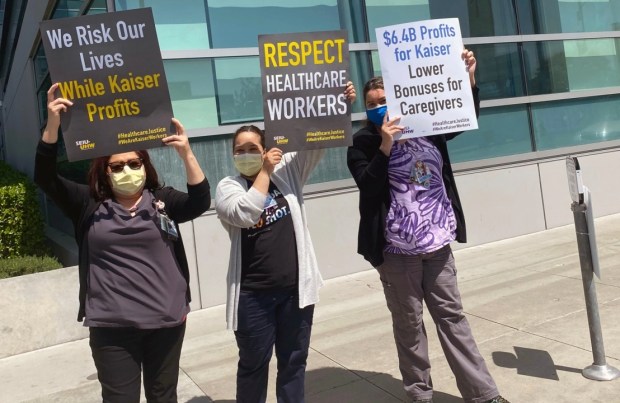Kaiser Permanente and the Alliance of Health Care Unions reached a tentative agreement Saturday on a four-year contract, avoiding a strike set to begin Monday.
The strike would have seen nearly 27,000 Kaiser Permanente in 22 local unions walk off their Southern California jobs beginning Nov. 15.
“The Alliance of Health Care Unions fought to preserve a Kaiser Permanente where patients can count on excellent patient care and service. This has guided our work for 24 years. This agreement will mean patients will continue to receive the best care, and Alliance members will have the best jobs,” said Hal Ruddick, executive director of the alliance. “This contract protects our patients, provides safe staffing, and guarantees fair wages and benefits for every Alliance member.”
The employees number 30,000 statewide and in Oregon. They have complained of being understaffed and said Kaiser’s plan to lower wages for incoming and future workers would worsen the problem.
The alliance said terms of the contract include guaranteed, across-the-board wage increases each year through 2025; no reductions to family medical and dental coverage; maintaining retirement income benefits and employer-subsidized retiree medical; introduction of the Alliance Bonus Plan, which provides annual payouts for achieving new mutual objectives to address affordability; and opportunities for career growth and advancement.
The two sides also agreed to form a national affordability and competitiveness task force to “find innovative ways to address issues of affordability while continuing to work together to protect high-quality patient care.”
“The past 20 months of the pandemic have been tough, and we made deep, personal sacrifices so we could keep helping our patients and our communities,” said USW Local 7600 President Michael Barnett in a statement. “We’ve more than earned a fair contract that reflects our contributions to Kaiser Permanente’s continuing success.” Local 7600 represents workers at 72 Kaiser locations in Southern California
The deal now goes to the full common issues committee, and then to union members for ratification. Voting will occur over the next several weeks. If ratified, the agreement will have an effective date of Oct. 1.
Christian Meisner, senior vice president and chief human resources officer at Kaiser Permanente, said the “landmark agreement positions Kaiser Permanente for a successful future focused on providing high-quality health care that is affordable and accessible for our more than 12 million members and the communities we serve. It also underscores our unwavering commitment to our employees by maintaining industry-leading wages and benefits.
“These were challenging negotiations, but this tentative agreement demonstrates the strength of our labor-management partnership and the unique success it can achieve when we work together.”

A wide footprint
Monday’s strike would have affected 366 Southern California hospitals and medical centers in Anaheim, the Antelope Valley, Baldwin Park, Downey, Fontana, Harbor City, Irvine, Los Angeles, Ontario, Panorama City, Riverside, San Diego, West Los Angeles and Woodland Hills.
Roughly 21,000 members of United Nurses Associations of California/Union of Health Care Professionals had been scheduled to begin an open-ended strike in Southern California. They were to be joined in Southern California by about 7,400 members of United Steelworkers and by 3,400 members of Oregon Federation of Nurses and Healthcare Professionals.
Various other Kaiser employee unions had announced plans to hold sympathy strikes with the nurses over the course of the week.
Workers ranging from nurses, pharmacists and physician assistants, to occupational therapists, appointment clerks and environmental service employees, had planned to participate. They were protesting Kaiser’s plan to implement a two-tier wage system that would lower pay for incoming and future healthcare workers.
In addressing the plan, Kaiser said the healthcare landscape is changing and the company risks losing ground in its ability to provide affordable care and competitive pricing.
“Looking ahead, we simply must reduce expenses to remain competitive long term,” Kaiser said previously. “Our wages and benefits represent more than 50% of our overall cost structure.”
Keeping operations going
In a message to members, Kaiser said it was prepared to shift workloads and cancel some appointments to ensure it remained operational.
“We are actively coordinating with community hospitals and other needed clinical providers to help with patient needs,” the healthcare giant said. “If you need care, visit kp.org/getcare or use our mobile app, where you’ll be able to access all your care options.”
In anticipation of a strike, Kaiser had moved some on-site appointments to phone or video visits, while other appointments, elective surgeries and non-urgent needs were rescheduled or canceled.
“We’ll contact you in advance if there are changes to your appointments,” the healthcare provider said. “We apologize for any inconvenience.”
If a walkout had occurred, Kaiser was prepared to temporarily close its pharmacies, although prescriptions could have still been filled through its mail-order delivery service.
The healthcare provider recently offered Alliance leaders an updated proposal the company said would give workers as much as 4% a year in pay increases, with no takeaways to their benefits and retirement programs.
It would provide the potential for 2% pay increases plus a 2% cash payout each year of a four-year contract.
A union representative said the cash payout would be taxable, which means the entire yearly package wouldn’t actually amount to a 4% pay increase.
The two sides are bargaining every day, he said, but it doesn’t appear a resolution will be reached before Monday.
